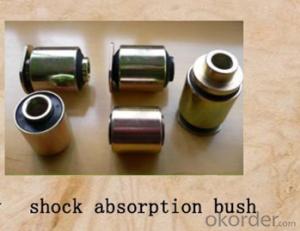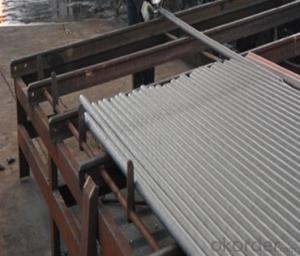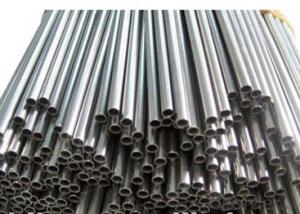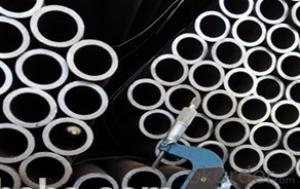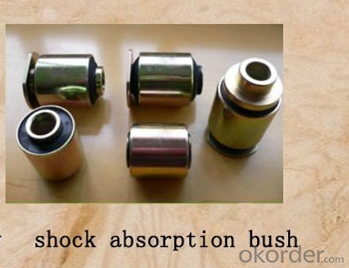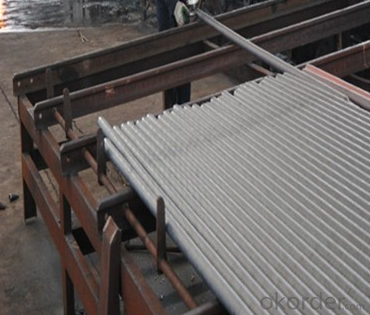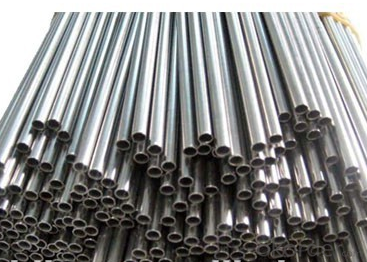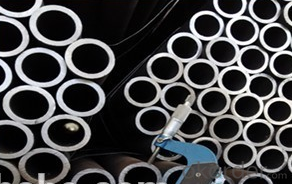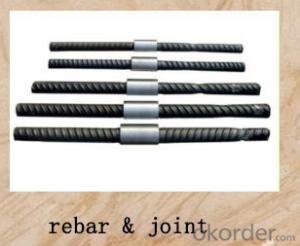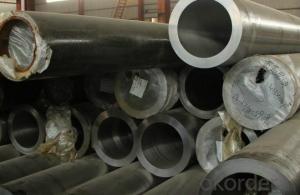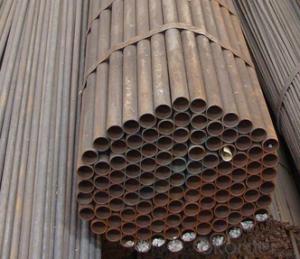1020 Carbon Seamless Steel Pipe 20CrMo CNBM
- Loading Port:
- Qingdao
- Payment Terms:
- TT OR LC
- Min Order Qty:
- 10 pc
- Supply Capability:
- 30 pc/month
OKorder Service Pledge
OKorder Financial Service
You Might Also Like
Quick Details
| Thickness: | 1 - 40 mm | Section Shape: | Round | Outer Diameter: | 21.3 - 609.6 mm |
| Secondary Or Not: | Non-secondary | Application: | Fluid Pipe | ||
| Technique: | Hot Rolled | Certification: | BV | Surface Treatment: | Other |
| Special Pipe: | Thick Wall Pipe | Alloy Or Not: | Non-alloy | Standard: | API 5L,API |
Packaging & Delivery
| Packaging Detail: | Standard seaworthy export packing with steel strip or with plastic clothe, or as requests from the coustomer. |
| Delivery Detail: | 7-25 days after receiveved the deposit |
Specifications
Seamless Steel Pipe
Standard:API ASTM DIN
Size:OD:21.3mm-609.6mm
WT:1mm-40mm
Mechanical properties
standard | grade | Tensile strength(MPA) | yield strength(MPA) |
ASTM A106 | A | ≥330 | ≥205 |
B | ≥415 | ≥240 | |
C | ≥485 | ≥275 |
Chemical ingredients
standard | grade | Chemical ingredients | |||||||||
C | Si | Mn | P | S | Cr | Mo | Cu | Ni | V | ||
ASTM A106 | A | ≤0.25 | ≥0.10 | 0.27~0.93 | ≤0.035 | ≤0.035 | ≤0.40 | ≤0.15 | ≤0.40 | ≤0.40 | ≤0.08 |
B | ≤0.30 | ≥0.10 | 0.29~1.06 | ≤0.035 | ≤0.035 | ≤0.40 | ≤0.15 | ≤0.40 | ≤0.40 | ≤0.08 | |
C | ≤0.35 | ≥0.10 | 0.29~1.06 | ≤0.35 | ≤0.35 | ≤0.40 | ≤0.15 | ≤0.40 | ≤0.40 | ≤0.08 | |
| Company Name | Tianjin Xinlianxin | ||
| Business Type | Manufacturer and Exporter | ||
| Product | steel pipe | ||
| Main Products and Standards | |||
| product name | Specification Range | steel Grade | Executive Standard |
| Structure Pipe | 20mm-820mm 1/2"-32" | 10,20,35,45,16Mn,A53AB | GB/T8162-1999,ASTM A53-98,ASTM500-98,ASTM 500-98,JISG3441-1998,JISG3444-1994 |
| Pipe for Liquid Transportation | 20mm-820mm 1/2"-33" | 10,20,Q345(16Mn),A53AB,A192,SGP | GB/T8163-1999,ASTM A53-98,ASTM A192,JISG3452-1997 |
| Boiler Pipe | 20mm-820mm 1/2"-35" | 20,20G,A179,A106B,A192,ST37.0,ST44.0,ST35.8,ST45.8,Gr320 | GB3087-1999,GB5310-1995,ASTM A106,ASTM A179,ASTM A192,DIN-1629-1984,DIN17175,BS3059.1-1987 |
| 1 | Product | seamless steel pipe | |
| 2 | Standard | U.S.A. | ASTM A53/A106/A178/A179/A192/A210/A213/ A333/A335/A283/A135/A214/A315/A500/A501/A519/A161/A334 API 5L/5CT |
| Japan | JIS G3452/G3454/G3456/G3457/G3458/G3460/3461/3462/3464 | ||
| German | DIN 1626/17175/1629-4/2448/2391/17200 SEW680 | ||
| Britain | BS 1387/1600/1717/1640/3601/3602/3059/1775 | ||
| Russia | GOST 8732/8731/3183 | ||
| China | GB/T8162/T8163 GB5310/6579/9948 | ||
| 3 | Material Grade | U.S.A. | Gr. B/Gr.A/A179/A192/A-1/T11/T12/T22/P1/FP1/T5/4140/4130 |
| Japan | STPG38,STB30,STS38,STB33,STB42,STS49, STBA23,STPA25,STPA23,STBA20 | ||
| German | ST33,ST37,ST35,ST35.8,ST45,ST52,15Mo3, 13CrMo44, 1.0309, 1.0305, 1.0405 | ||
| Britain | Low, Medium, high | ||
| Russia | 10, 20, 35, 45, 20X | ||
| China | 10#, 20#, 16Mn, 20G, 15MoG, 15CrMo, 30CrMo, 42Crmo, 27SiMn, 20CrMo | ||
| 4 | Out Diameter | 21.3mm-609.6mm | |
| 5 | Wall Thickness | 2.31mm-40mm | |
| 6 | Length | As per customers' requirements | |
| 7 | Protection | Plastic caps/ Wooden case | |
| 8 | Surface | Black painting/varnished surface,anti-corrosion oil, galvanized or as per required by customer | |
- Q: How are steel pipes used in the manufacturing of heat exchangers?
- Steel pipes are commonly used in the manufacturing of heat exchangers due to their excellent heat transfer properties and durability. They are utilized as the main components for carrying and transferring hot or cold fluids within the heat exchanger system. The steel pipes ensure efficient heat exchange by providing a smooth and continuous flow of the fluid, while also withstanding high temperatures and pressures. Additionally, steel pipes are often preferred for their corrosion resistance, making them suitable for various industrial applications requiring reliable and long-lasting heat exchangers.
- Q: What are the different types of threading on steel pipes?
- There are several types of threading commonly used on steel pipes, including tapered or NPT (National Pipe Taper), straight or NPS (National Pipe Straight), and British Standard Pipe (BSP) threading. These different types of threading are designed to ensure a secure and leak-free connection between pipes and fittings.
- Q: Can steel pipes be used for underground sprinkler systems?
- Yes, steel pipes can be used for underground sprinkler systems. Steel pipes are known for their durability and strength, making them a suitable choice for underground applications. They are resistant to corrosion and can withstand high pressure and temperature, making them suitable for delivering water to sprinkler heads. However, it is important to note that steel pipes may require additional coatings or protective measures to prevent rusting and corrosion over time. Additionally, steel pipes may be more expensive than other materials such as PVC or polyethylene, so the cost factor should be considered as well. Overall, steel pipes can be a viable option for underground sprinkler systems, particularly in areas with harsher environmental conditions.
- Q: How are steel pipes used in fire protection systems?
- Steel pipes are commonly used in fire protection systems because of their durability and resistance to high temperatures. They are used to transport water or other fire suppressants to sprinkler heads or fire hydrants, ensuring quick and efficient extinguishing of fires. The strength of steel pipes also allows them to withstand the pressure and force of water flow, making them a reliable choice for fire protection systems.
- Q: What is the difference between standard wall thickness and extra-strong wall thickness steel pipes?
- The main difference between standard wall thickness and extra-strong wall thickness steel pipes lies in their thickness and durability. Standard wall thickness pipes have thinner walls and are suitable for most general applications, while extra-strong wall thickness pipes have thicker walls and are designed for heavy-duty or high-pressure applications. These extra-strong pipes offer enhanced strength and resistance, making them more reliable and suitable for handling extreme conditions or demanding projects.
- Q: What are the applications of galvanized steel pipes?
- Galvanized steel pipes have a wide range of applications across various industries. They are commonly used in plumbing systems for water supply and drainage systems due to their corrosion resistance and durability. Additionally, they are used in the construction industry for structural supports, scaffolding, and fencing. Galvanized steel pipes are also widely utilized in agricultural irrigation systems and in the transportation of liquids and gases.
- Q: Can seamless steel pipe and ordinary steel pipe be welded?
- Seamless steel tube branch and seamed two, seamed steel pipe welding is formed, all two can be welded together, if you do not allow the use of seam tube cannot connect.
- Q: How long do steel pipes last?
- The lifespan of steel pipes can vary depending on several factors, including the quality of the steel used, the environment in which they are installed, and the maintenance and care given to them. Generally, steel pipes are known for their durability and longevity. With proper installation and regular maintenance, steel pipes can last for several decades, often exceeding 50 years. However, it is important to note that external factors such as corrosion, exposure to extreme temperatures, and chemical reactions can significantly affect their lifespan. Regular inspections, timely repairs, and protective coatings can help extend the life of steel pipes, ensuring their reliability and functionality for many years.
- Q: What are the safety precautions to follow when working with steel pipes?
- When working with steel pipes, it is important to follow several safety precautions to prevent accidents and injuries. Some key precautions include wearing appropriate personal protective equipment such as gloves, safety glasses, and steel-toed boots to protect against potential hazards. It is also crucial to inspect the pipes for any damage or defects before using them and ensure they are properly secured and supported during installation. Additionally, workers should use caution when handling heavy or sharp-edged pipes and use proper lifting techniques to prevent strains or sprains. Following safety protocols, including using the correct tools and equipment, practicing good housekeeping, and staying alert and focused, is essential to minimize risks and maintain a safe working environment.
- Q: Can steel pipes be used for underground chemical injection?
- Underground chemical injection can utilize steel pipes. These pipes are widely employed across industries due to their durability, strength, and resistance to corrosion. For underground chemical injection purposes, steel pipes bring various advantages. They can endure high pressure and temperature, making them suitable for the transportation and injection of chemicals into the ground. Furthermore, steel pipes exhibit superb chemical resistance, guaranteeing that they will not interact with the injected chemicals and compromise the system's integrity. Nevertheless, it is crucial to select the appropriate grade of steel pipe that is compatible with the specific chemicals being injected to ensure optimal performance and longevity. Regular maintenance and inspections are also necessary to identify any potential corrosion or damage to the pipes, thus ensuring the safe and efficient operation of the chemical injection system.
Send your message to us
1020 Carbon Seamless Steel Pipe 20CrMo CNBM
- Loading Port:
- Qingdao
- Payment Terms:
- TT OR LC
- Min Order Qty:
- 10 pc
- Supply Capability:
- 30 pc/month
OKorder Service Pledge
OKorder Financial Service
Similar products
Hot products
Hot Searches
Related keywords
